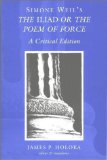Short and powerful, like her sentences, Simone Weil’s essay cuts to the center of things.
The true hero, the true subject matter, the center of the Illiad is force. The force that men wield, the force that subdues men, in the face of which human flesh shrinks back. The human soul seems ever conditioned by its ties with force, swept away, blinded by the force it believes it can control, bowed under the constraint of the force it submits to. Those who have supposed that force, thanks to progress, now belongs to the past, have seen a record of that in Homer’s poem; those wise enough to discern the force at the center of all human history, today as in the past, find in the Illiad the most beautiful and flawless of mirrors.
Weil holds that mirror close, highlighting short passages from the text, turning them to reflect their mute force. It is as if she has finally set out to do what she once imagined: to translate the Illiad; in a few pages managing—in an accomplishment proper to a Borges story—to not only translate the whole, but seemingly to write it fresh. She gives us the true Illiad, masked all this time by the copy we have unwittingly been reading.
When she writes, “This is what makes the Illiad unique, this bitterness emerging from tenderness and enveloping all men equally, like the bright light of the sun,” it is in fact performative. Tenderly bitter, holding nothing back, playing no favorites, Weil writes it into acrid being. What makes the central claim of this new Illiad “true” is not fidelity, but the brute, focused, force of its own writing. It is as if she understood only too well the difficult strategy and the risk:
The tempered use of force, indispensable to the escape from its machinery, would demand superhuman virtue, as rare as steadfast dignity in weakness. Further, moderation itself carries risks, for the prestige that is three-fourths of force consists above all of the magnificent indifference of the strong toward the weak…
At what cost this tempered, tender, but forceful essay? Perhaps worried that moderation would not serve, Weil cuts deep, cleaving things in two, marveling at the gaping beauty of the chasm. People are either things or human, alternating with the shifting fortune of the battlefield, first stony and then moving. If there are moments when things are undecided it seems not so much a result of the possibility of finding new relations, but through a kind of suspension of time, the coin of fate suspended in midair, not yet landed, speaking equally of hope and terror. But the sides, while of the same coin, will never relate. To be sure, Weil will speak of the moments when something shines through the the dark cloud of violence, fully human despite its surroundings. The love of one’s family, of one’s comrades, even of one’s enemies. And yet the chasm remains.
Perhaps it is as she says: to let go of the force would bring us straight to the unimaginable. To bridge the gap between us and our enemy, releasing the cycle of violence would confront us with our inconsolable loss. The thought that love might not be the polar opposite of retribution might be too much to bear. If all this blood is shed not for Helen or Troy, better that we imagine it as tragedy. Better that it be for naught, than to think the violence is caught up with the love of one’s comrades and enemies, a love born even of the stupid cauldron of war. Perhaps Weil saw this—saw even the horror of seeing it, while still not being able to change course. And perhaps for this reason, like the Illiad, the essay is short on hope for its escape trajectory. Weil, like the tragic Greeks, understood how to mourn.
To end this reflection, then, by evoking education would seem either in horrible poor taste, after such bloodshed and hopelessness, or already self evident: can we feel any more pressing call to understand ourselves? But I have something else in mind, neither crass nor forcefully bitter. It is rather to speculate that education is not so simply the other of war and violence, but is closer, more embroiled, than we might imagine. “For those wise enough to discern the force at the center of all human history, today as in the past…”

… [Trackback]…
[…] Read More: splittingskulls.com/chrismoffett/the-illiad-or-the-poem-of-force […]…
… [Trackback]…
[…] Read More Infos here: splittingskulls.com/chrismoffett/the-illiad-or-the-poem-of-force […]…
… [Trackback]…
[…] Find More Informations here: splittingskulls.com/chrismoffett/the-illiad-or-the-poem-of-force […]…